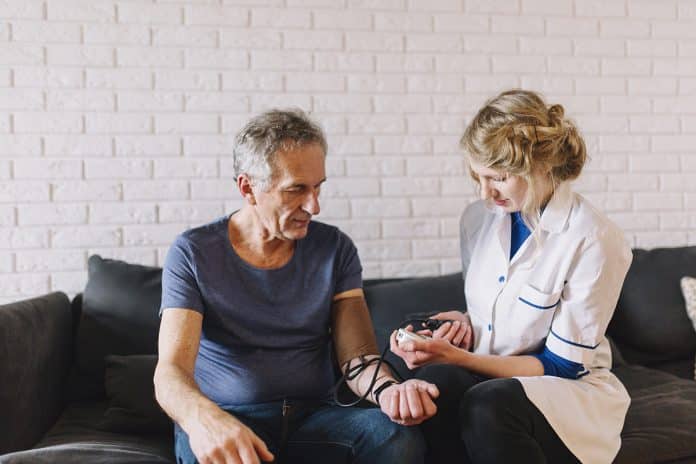As the global population ages, the prevalence of chronic conditions like diabetes becomes an increasingly prominent aspect of healthcare. Indeed, diabetes management in the elderly is not just about controlling blood sugar levels. It’s also about integrating care into the broader context of age-related changes and multiple health considerations.
Type 1 and Type 2 diabetes require lifelong management that can become increasingly difficult in one’s later years. Factors such as diet, physical ability, cognitive function, and emotional well-being are all integral to effective diabetes management, but are often affected by the ageing process. As a result, caregivers must adapt their approach to accommodate these changing needs to ensure that care remains effective and compassionate. Below are some challenges and setbacks that caregivers and family members of elder patients with diabetes often experience, as well as some simple tips on how to overcome them:
Blood Sugar Monitoring
Effective blood sugar monitoring is a cornerstone in the care of elderly individuals with diabetes. Sadly, challenges such as an elder’s forgetfulness or resistance to testing are quite common. This is why caregivers must establish a routine that accommodates these and other issues that may arise.
Taking accurate blood sugar readings is especially important for making necessary adjustments in medication or diet, particularly for type 1 diabetes management, where blood glucose can fluctuate significantly. A caregiver’s diligence and adaptability in proper monitoring practices are crucial to ensure the consistent management of blood sugar levels to maintain overall health and prevent complications.
Diet Management
For elders, particularly those accustomed to specific eating habits, introducing diet changes can be challenging. While there’s a need to balance blood sugar levels, it’s also crucial to meet nutritional needs and at the same time respect the patient’s personal preferences.
Caregivers need to be aware of how different foods affect blood sugar and be creative in preparing appetising diabetes-friendly meals. This often involves a deep understanding of carbohydrate counting, portion sizes, and the glycemic index of foods. Additionally, diet management in elders with diabetes includes being vigilant about meal timings because irregular eating patterns can disrupt blood sugar control.
Medication Management
Another important thing that caregivers need to monitor is medication management, especially in elders who may be on a regimen of multiple drugs for various conditions. The challenge for caregivers is making sure that diabetes medications are administered correctly and on time. This includes understanding dosages, the timing of drugs relative to meals, and recognising potential side effects. Caregivers also need to be aware of drug interactions, particularly in elders who are taking different medicines. Effective medication management helps control blood sugar levels and reduces the risk of complications, thereby contributing to the overall well-being of the elderly.
Exercise and Physical Activity
Physical activity is integral to diabetes management, yet it presents unique challenges in elderly care. The reduced mobility and varying physical capabilities common in older adults require a tailored approach to exercise, as balancing the need for activity with their physical limitations is a crucial consideration.
It’s important for caregivers to collaborate with healthcare professionals to design exercise routines that are safe, enjoyable, and effective in helping regulate blood sugar levels. Some common gentle exercises such as walking, stretching, or chair-based activities are excellent ways to gradually introduce elders to physical activity. That said, always be mindful of the elderly patient’s endurance and other health conditions that may impact their ability to exercise.
Medical Appointments and Coordination of Care
Regular medical check-ups are vital for effective diabetes management. For the elderly, these appointments are critical touchpoints for monitoring the progression of diabetes and adjusting care plans. The caregiver’s role extends to coordinating these appointments to ensure consistent communication between different healthcare providers, as well as keeping track of medical advice and changes in medication or treatment. This coordination is important not only for managing diabetes but also for addressing other age-related health issues that might affect diabetes care.
Monitoring for Complications
If not managed properly, diabetes can lead to a variety of complications, some of which are especially dangerous for the elderly. These complications include cardiovascular diseases, neuropathy, retinopathy, and kidney problems. Vigilance in monitoring for signs of these conditions is a vital aspect of elder diabetes care. Caregivers need to be aware of the symptoms of these complications and maintain regular screenings as recommended by healthcare providers. Early detection and intervention help prevent the progression of these complications and support older people’s quality of life.
Emotional and Psychological Support
Elders may experience various emotions, from frustration to sadness or even denial about their condition. These emotions can significantly impact their motivation and ability to manage their diabetes effectively. Hence, caregivers must understand these psychological challenges, offer emotional support, and encourage a positive outlook. Empathetic communication and professional psychological support can be vital in helping the elderly cope with the emotional burden of diabetes.
Financial Considerations
The cost of medications, dietary needs, medical supplies, and healthcare services can be substantial, which makes the financial aspect of managing diabetes a significant consideration for many family members and caregivers. People taking care of the elderly patient need to be aware of these monetary demands and plan accordingly. They may consider exploring insurance coverage, seeking financial assistance programs, and budgeting for out-of-pocket expenses. Being informed about the financial implications helps manage diabetes without undue financial stress.
Communication with Healthcare Professionals
Caregivers must proactively discuss concerns, share observations about the elder’s health, and seek advice on care strategies from certified healthcare professionals. This is to ensure that all parties involved are aligned in their approach and understanding of the elder’s condition. Strong communication facilitates a more cohesive and comprehensive care plan.
Reflecting on Effective Diabetes Care in the Elderly
The management of diabetes in the elderly requires a holistic approach that extends beyond mere medical intervention. It demands vigilant monitoring, dietary precision, and medication accuracy, as well as an understanding of the unique psychological and physical needs of older adults. Caregivers play a pivotal role in this process as they implement strategies to suit individual requirements and evolving health conditions.
Looking ahead, the focus in elder diabetes care should remain on continuous improvement of care methods, keeping abreast of medical advancements, and fostering an environment of empathy and efficiency. Ultimately, the goal is to enhance the quality of life for elders with diabetes through attentive and compassionate care.
























